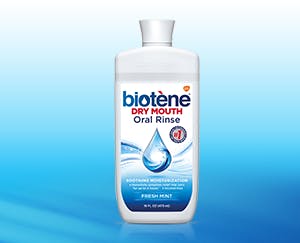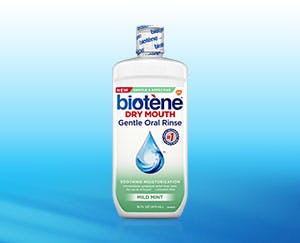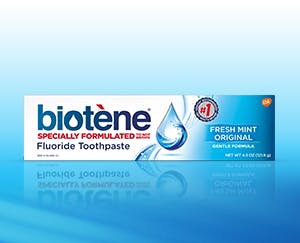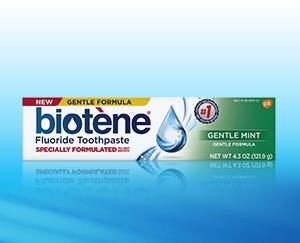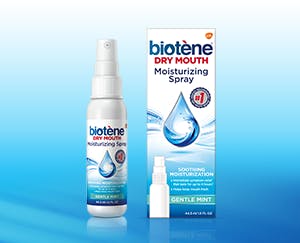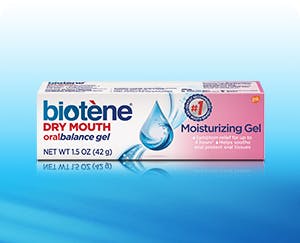Dry mouth symptoms can be an annoying feeling, but it can also cause other oral-related issues that might impact you. One of these additional symptoms is known as oral thrush. This is a fungal infection of your mouth that is found in infants and among older people with dentures,4 though it can affect anyone.2 Learn what causes this condition and its relationship to dry mouth symptoms, as well as how to take care of your oral health to prevent it.
What is oral thrush?
Oral thrush is caused by a fungus called Candida albicans, which accumulates on the lining of your mouth.1 While Candida is a normal organism in your mouth, it can overgrow and cause symptoms.1
Oral thrush appears as creamy white lesions that appear primarily on your tongue or inner cheeks, though it can also spread throughout your mouth to the gums, tonsils, or the back of your throat.1 If thrush appears down the length of your esophagus, it may feel difficult to swallow food or water, and there might be pain that feels as if food is getting stuck in your throat.1
If you come down with oral thrush, you might feel the following symptoms:2
- Redness and soreness inside your mouth
- Loss of sense of taste (ageusia)
- Cottony feeling in your mouth
- Pain or difficulty swallowing
- A feeling that food gets stuck in your throat or chest
Fortunately, oral thrush in adults is not contagious4, and furthermore, and it’s usually harmless.4 And with people who have healthy immune systems, oral thrush rarely causes complications.2 However, if you have a weakened immune system, Candida can enter your bloodstream and spread to other areas of your body like your eyes, brain or heart.2 Always consult with your dentist or healthcare provider, as they can provide guidance and treatment.
How dry mouth symptoms and oral thrush can be related
Dry mouth symptoms, also known as xerostomia, occurs when the mouth doesn't produce enough saliva.3 Dry mouth symptoms can occasionally happen if you’re dehydrated but when it feels like a chronic condition, this could point to an underlying health condition.3
Candida infection (the cause of oral thrush) is more likely to develop in people who have dry mouth symptoms.2 Saliva helps lubricate your mouth and keeps it clean.3 When the immune system in your mouth fails to maintain a balance of microbes that inhabit your body, this can increase the amount of candida fungus and lead to oral thrush.1
Always consult with your dentist or healthcare provider, as they can provide guidance and treatment.
How to prevent oral thrush
Maintaining oral health is vital to avoiding oral thrush. Be sure to follow the home care routine that your dental professional has outlined for you, which might include rinsing your mouth frequently with water, brushing your teeth at least twice a day and clean interdentally daily.1 If you wear dentures, follow the directions given by your dental professional, which may include taking them out at night and cleaning them daily.1 Visit your dentist or healthcare professional if you seem to have any symptoms or developments of oral thrush.1
If you’re experiencing dry mouth symptoms, you’re not alone: Biotene helps provide relief and comfort for dry mouth symptoms and increasing saliva production. Thanks to an alcohol-free formula, Biotène Dry Mouth Oral Rinse can be used daily to help provide soothing dry mouth symptom relief and possibly minimizing the chances of developing oral thrush.
Source Citations:
- Oral Thrush. Mayo Clinic. https://www.mayoclinic.org/diseases-conditions/oral-thrush/symptoms-causes/syc-20353533/ Accessed 4/17/2024.
- Thrush. Cleveland Clinic. https://my.clevelandclinic.org/health/diseases/10956-thrush/ Accessed 4/17/2024.
- Dry Mouth (Xerostomia). Cleveland Clinic. https://my.clevelandclinic.org/health/diseases/10902-dry-mouth-xerostomia/ Accessed 4/17/2024.
- Oral thrush (mouth thrush). NHS. https://www.nhs.uk/conditions/oral-thrush-mouth-thrush/ Accessed 4/17/2024.



